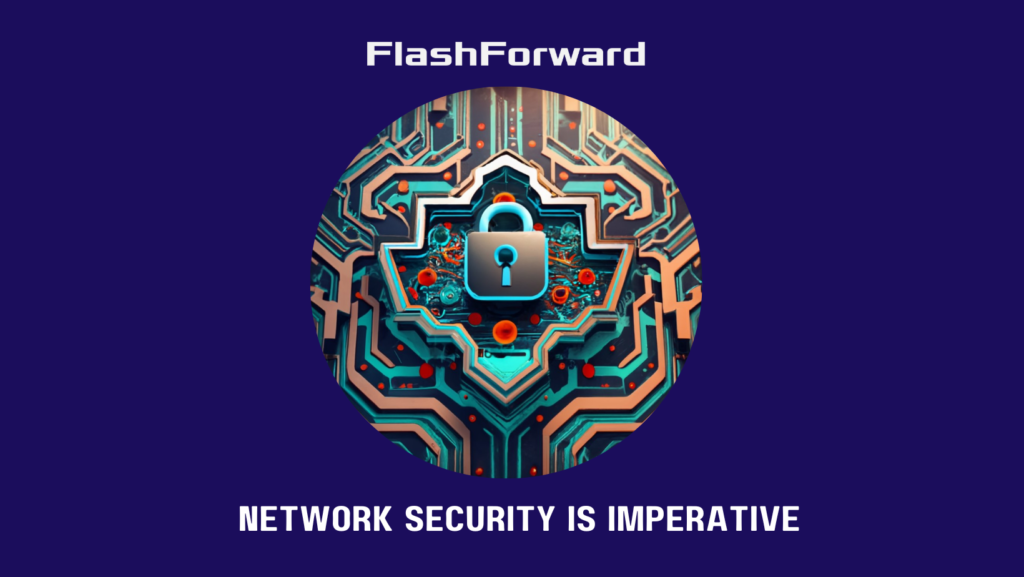In today’s digital era, data powers the information economy and drives innovation. However, data needs to be protected and requires robust security measures to prevent unauthorized access and breaches. Network security is the frontline defense in protecting this invaluable asset, ensuring that the integrity, confidentiality, and availability of data are maintained.
An attacker does not care who they are targeting, and most businesses are susceptible to cyber-attacks.

The Criticality of Network Security:
Network security is a comprehensive approach that encompasses various technologies, processes, and policies designed to safeguard business network infrastructure and data.
The importance of network security cannot be overstated, as it plays a crucial role in preventing cyberattacks, such as malware, distributed denial-of-service (DDos), ransomware, and phishing etc., which can have devastating consequences for businesses as well as individuals.
Network and Data Security:
- Preventing Data Breaches: A data breach can result in the loss of sensitive information, such as customer data, financial records, and intellectual property. Data breaches occur more often than we’d like to think and can lead to financial losses and reputational damage.
- Protecting Against Cyberattacks: Cyberattacks are becoming increasingly more common and sophisticated, with attackers employing various tactics to exploit vulnerabilities in network infrastructure. Network security measures, such as firewalls, intrusion detection systems, and antivirus software, are essential in preventing these attacks.
- Ensuring Business Continuity: Cyberattacks disrupt business operations and can lead to downtime and loss of revenue. By implementing robust network security measures, businesses can mitigate the risk of disruptions and ensure that operations continue smoothly.
- Compliance with Regulations: Many industries have regulations and standards that mandate the protection of data. Failure to comply with these regulations can result in hefty fines and legal consequences. Network controls ensure businesses meet compliance requirements.
For example, companies that deal with protected health information must have physical, network, and process security measures in place and follow them to ensure HIPAA Compliance*.
Compliance with data privacy regulations and ensuring business continuity is top of mind for most businesses.

Network security plays a vital role in protecting data by:
Encrypting Data: Encryption is a crucial aspect of network security, ensuring that data is protected during transmission and storage.
Implementing Access Controls: Access controls restrict access to sensitive data, ensuring that only authorized individuals can access it.
Monitoring Network Traffic: Monitoring network traffic helps identify and mitigate potential threats in real-time.
Updating Security Measures: Regular updates and patches are essential in addressing vulnerabilities and protecting against new threats.
SD-WAN Improves Network Security
Software Defined Wide Area Network (SD-WAN) is like creating a special, private network that connects all the offices of the business, no matter where they are located. It helps the business send files, use applications, and communicate faster and more securely, without any outsiders being able to access or see what they are doing. It’s like having a private club for the business, where employees can work together and share things, without any worries. SD-WAN is considered to be a cost effective MPLS replacement.
SD-WAN provides the following security measures:
Encryption: SD-WAN can encrypt data traffic as it travels across the network, protecting it from interception or tampering by malicious actors.
Segmentation: allows for network segmentation, which can isolate sensitive data and applications from other parts of the network. This can help prevent the spread of malware and protect critical assets.
Firewall and IPS: Many SD-WAN solutions include built-in firewall and intrusion prevention systems (IPS) to block malicious traffic and detect and prevent cyberattacks.
Zero Trust Security: Some SD-WAN solutions adopt a Zero Trust security model, which means they do not automatically trust any device or user, even if they are inside the corporate network. This approach requires verification of every user and device trying to access resources in the network.
Centralized Policy Management: allows for centralized policy management, making it easier to enforce security policies across the entire network.
Improved Visibility and Monitoring: provides greater visibility into network traffic and can offer detailed monitoring and reporting capabilities, helping to identify and respond to security incidents more quickly.

Safeguarding your network is not just a necessity; it is imperative in today’s age.
The threats posed by cyberattacks are real, and the consequences can be severe, ranging from financial losses, reputational damage, and loss of customer trust. Network security, bolstered by advanced solutions like SD-WAN, provides a robust defense mechanism that not only protects the integrity, confidentiality, and availability of data but also ensures business continuity and overall operational efficiency. By investing in comprehensive network security measures, businesses can create a secure digital environment that fosters innovation, growth, and customer satisfaction.
The time to act is now; safeguard your business by calling FlashForward today!
